
Features
Blogs
Editor's Blog
Editor’s Blog
June 25, 2012 - We now return to regularly scheduled blogging . . .
After several weeks on the road at conferences, training sessions, trials, hearings, inquests, retirement dinners, meetings, interviews, photo and video shoots, and the occasional golf tournament (shhh!), I’m getting grief from regular readers who have been enjoying our new bloggers but lamenting the absence of my witty repartee and keen observations of the Canadian fire service.
June 25, 2012
By
Laura King
June 25, 2012 – We now return to regularly scheduled blogging . . .
After several weeks on the road at conferences, training sessions, trials, hearings, inquests, retirement dinners, meetings, interviews, photo and video shoots, and the occasional golf tournament (shhh!), I’m getting grief from regular readers who have been enjoying our new bloggers but lamenting the absence of my witty repartee and keen observations of the Canadian fire service.
OK, that’s a mild exaggeration, but people really have been asking, so here goes.
–
There’s certainly some irony in the fact that Toronto’s HUSAR team was dispatched this weekend to Elliot Lake after the roof of a shopping mall collapsed.
We still don’t know how many shoppers are injured, missing, trapped or dead.
But we do know that should this type of incident happen in, say, February, due to heavy snow piled on a flat shopping-centre roof, there will be no HUSAR team to send, because Ottawa has cancelled funding for the Joint Emergency Preparedness Program.
As Peter Sells eloquently points out in his June Flashpoint column – which you can read here – at least no more taxpayer money will be spent on programs for which the federal government has no will or purpose.
So frustrating.
–
The Ontario Fire College threw a highly entertaining send-off Wednesday night in Rama for Ed Godden, the OFC’s well-respected academic manager, who has retired from the fire college but, as he said in an email, gets “to keep working with the fire service in Ontario!”
Ed has already started his new job with the Public Services Health & Safety Association and will, no doubt, entertain his new colleagues with his version of fire-service humour!
Fire Marshal Ted Wieclawek was supposed to be the first speaker Wednesday evening but was laid up with a minor injury, so OFC principal Fred McLennan spoke on the fire marshal’s behalf from notes provided by the OFM (and then promptly edited with principal-like red pen!).
I can’t do justice to the speech or the speaker but suffice to say that my cheeks hurt from laughing at the Fred/Ted/Ed Show.
Here are some photos from the soiree.
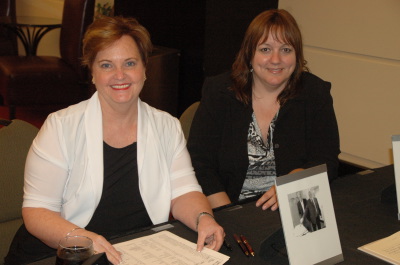
|
|
| The Ontario Fire College's Jana Gillis and Tracey Sylvester, the welcoming committee at Ed Godden's retirement soiree. |
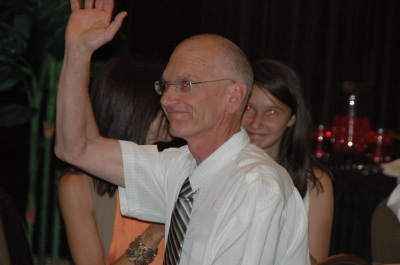
|
|
| Retiring OFC academic manager Ed Godden appreciates the accolades and reflections at a reception in his honour on June 20 at Casino Rama. |
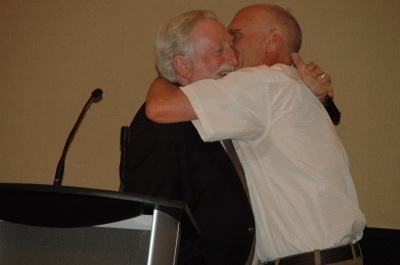
|
|
| OFC principal Fred McLennan and Ed Godden . . . |
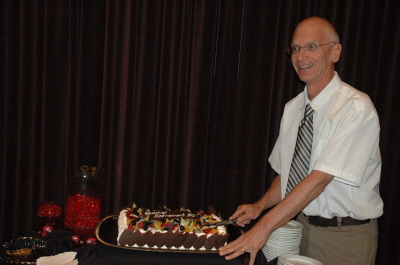
|
|
| No retirement party is complete without cake, says Ed! |
–
I make it a point never to forget a face, and I’m better with names now than I used to be after adopting strategies taught in those highly priced courses (repeat the name, associate the name with someone/something/a particular characteristic, or, my favourite – write it down!) . . . Anyway, I was thrilled to spot former Canadian Firefighter columnist and blogger Tim Beebe at Ed Godden’s retirement party last week (no, no, I didn’t forget Tim’s name . . . stick with me, we’ll get to the point).
Tim is the new fire college instructor for northern Ontario and was at the college for a couple of days last week. He and I were supposed to meet last Monday at Pearson International Airport for a quick catch up but then Tim’s plans changed. Neither of us knew the other would be at Ed’s send-off and we were pleasantly surprised to see each other.
After the formal part of the evening wrapped up, I wandered over to Tim’s table, where he was sitting with several other instructors. As Tim introduced me to his colleagues, I stopped mid-handshake with one gentleman and said (because I never forget a face): “You look very familiar.”
“I should,” he said. “I spent last Thursday with you at training in Quinte West.”
Indeed he did, and, although I have no idea after being introduced to him twice in less than a week, what his name is, I’m some glad I never forget a face! He is on Tim’s left in the photo (Tim is in the middle) and is the instructor in the photo below.
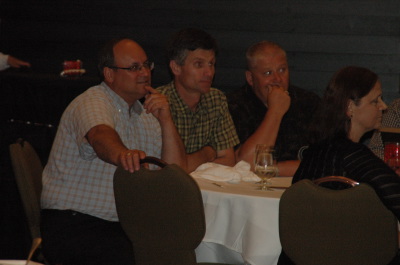
|
|
| Ontario Fire College instructors Tim Beebe (centre) and others . . . |
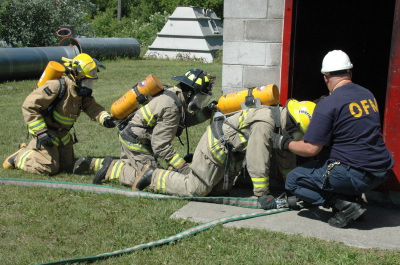
|
|
| Students participate in search and rescue training at Quinte West with OFC instructor . . . |
–
The training at Quinte West was an eye-opener. Twenty-five students, six instructors, several organizers, four days at a fabulous training centre (watch for our story in the magazine) and a regional effort – from the building to the equipment to the food provided by a local auxiliary – to train volunteer firefighters.
I had promised Prince Edward Deputy Chief Rob Rutter ages ago that I’d visit the centre but schedules conflicted a couple of times and we finally agreed on a spring date that would eliminate weather worries and local hockey playoffs.
I got some great photos of firefighter survival training, search and rescue, and ventilation that we’ll use in the magazine with our training columns, but the most enlightening part of the day was lunch with a crew from Stirling-Rawdon (yep, the home of Kraft Hockeyville 2012!) – two young men, two young women and Chief Rick Caddick. The firefighters were asking questions and talking about the morning’s evolutions: “Can we wear knee pads for search and rescue?” “It’s not as bad as I thought being blacked out.” “My mom washed my balaclava last night.” (Don’t ask!).
The four firefighters had been on the department for different lengths of time but all had been to at least one fire. All were taking time off work to train. They were keen and committed. They had done training at the hall – twice a month and on their own time (Chief Caddick says he often sees the lights on at night while crews are practicing – on their own). Caddick urges recruits to do Module A within the first year on the department – it requires hours of prep time and written assignments to be handed in once the training component starts.
These young firefighters were much like the 450 volunteers at FDIC Atlantic in June– which is to say that they’re doing what they do because they want to, not because it’s a stepping stone to a career position, as is often the case for volunteer firefighters.
And that’s the eye-opening part. So many chiefs I’ve spoken to in the last several months are up to their ears in union issues while thousands of volunteer firefighters are giving up nights and weekends and taking time off work to train. It’s hard to believe in that my community, a firefighter lives three provinces away from the one in which he works, and can afford to drive or fly to Ontario from Nova Scotia for five or six 24-hour shifts a month but can’t be called back on overtime or to fill in for illness because of the, uh, commute.
Just one of those keen observations from a fire blogger . . .
Print this page